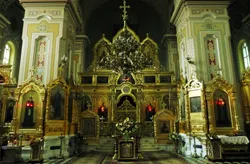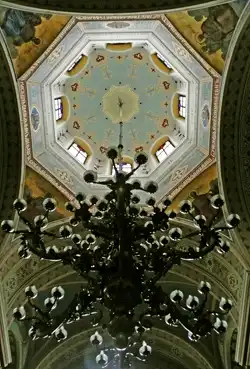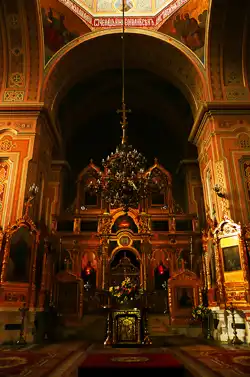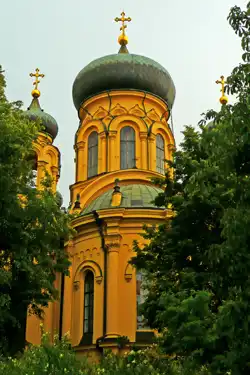I have been living in Poland for 16 years but I feel I am still a Russian even though I speak Polish at home and work, including I dream in Polish. Among my friends, there are emigrants from former countries of the Soviet Union, such as: Ukraine, Belarus, Russia, Uzbekistan and Latvia. We try to cultivate our common traditions. The New Year’s Eve is very important for those coming from the Soviet Union. We exchange gifts, dress a Christmas tree and we have a party. The majority considers New Year’s Eve a familiar holiday. This is because the Christmas time was not celebrated. This is the reason why people chose the last day of the year as their familiar holiday. The tradition of celebrating Christmas is coming back now. However, it is a free day we dress a Christmas tree on New Year’s Eve. On New Year’s Eve we have also Ded Moroz (the equivalent of Santa Claus) who gives presents. Ded Moroz, as opposed to his western collegue, is a “civil” person. However, we do not give presents on Christmas.
The next holiday is a military holiday which was converted into Men’s Day (since not so long ago it is a free day) like Women’s Day. At schools, girls give presents to boys and the vast majority of the male Russian population or the vast majority of the former Soviet Union are congratulated on the occasion of the Defender of Motherland Day, although they are not defenders. Generally, they make every effort to avoid going into the army. As I wrote, the Defender of the Motherland Day is equivalent to Women’s Day celebrated on 8th March – very respected holiday in Russia. Every year I receive several messages with wishes from my Russian colleagues and Russian-speaking Polish friends.
Maslenica is one of the most interesting examples of the Russian culture which reveals a mix of an ancient pagan holiday with Christian feast. It is celebrated during the last week preceding Lent. The equivalent of this holiday in Polish tradition may be, to some extent, the last Thursday of carnival. However, the maslenica lasts a whole week and the last weekend is the so called szerokaja maslenica. During the maslenica we fry pancakes which symbolize the Sun coming to us in the spring. The maslenica is a pagan holiday when winter is said goodbye and spring is welcomed. In ancient times, with the coming of spring there were held parties, the part of which survives until now. Nowadays, during the szerokaja maslenica it is possible to see a fist fight, bears and lapta (a team game). A known contemporary Russian director Nikita Michałkow showed, in an excellent way, the celebration of maslenica in his film “The Barber of Siberia.” A doll called Maslenica is burnt down at the end of the party. This symbolizes the end of winter. In Poland it is difficult to organize a real maslenica party but we fry pancakes and we gather round the table to talk. It is an occasion to meet each other.
Orthodox Easter is celebrated since not so long and it is similar to Christmas. It is a holiday during which even non-believers paint eggs and bake a kulicz (a traditional Eastern cake). Similarly to the Catholics, we take painted eggs and kulicz to the Orthodox church to consecrate them. However, we attend Easter mass at night. This is the time when we gather in the Orthodox church. Warsaw Orthodox believers meet at the church in Praga. Ambassadors and other diplomats from almost all Orthodox Churches of Greece, Serbia, Bulgaria, Russia, Ukraine, Georgia and Macedonia are present at the mass. We used to come at 23 o’clock when the mass is being celebrated. At midnight, the altar is opened and kresnyj chod – a procession round the church is started. Everybody circles the church three times with candles in their hands and then comes back to the church to pray until the morning, if one is eager and strong.
On Easter Sunday we say the words: ‘Christos Woskrese’ and respond ‘Wo istinu woskrese.’ We give three kisses. During the holiday we used to stay at home when everybody sits round the table and carries their painted egg.
The feasts which have appeared recently in the contemporary Russian culture do not enjoy much popularity. These are treated like national holidays or Women’s Day. The Orthodox faith gives us, to some extent, a sense of individuality and identity, closer relation with our culture.
National feasts are not particularly celebrated. Actually we have only three. The first one is called by the Russian “the independent day” and celebrated on 12th June. Actually, it is so called a Day of the Russian Declaration of Independence. Almost no one celebrates it. The second one is celebrated on 4th November (instead of 7th November) and it is not so popular. The third holiday in May is mostly celebrated – the so called Victory Day. However, it is a familiar holiday in families like mine, in which the grandfathers fought during the war. In Poland, we do not celebrate our national holidays but we remember them. On this occasion we offer wishes as everybody has their great-grandfathers who fought during World War II.
Do we have any more reasons to celebrate? There are a few, for example, the 45th anniversary of the Gagarin’s space flight which was the reason to hold a party in Warsaw by my friend. It was on 12th April which is the Astronautics Day. It is not a national holiday but almost anybody remember it. However, the fact that a Soviet man was the first in the space is the reason of our common heritage and pride. My colleague decided to hold a party during which we listened to the Gagarin’s voice, we sang “A Green-Grassed Lawn” – the song of cosmonauts and we had a great fun. It is said that there is no reason not to meet each other.
We cultivate our culinary customs by cooking borscht, szi (a soup made of sour cabbage), ucha (a fish soup), pielmieni. There are two restaurants with Russian cuisine in Warsaw but I would say it is a Soviet cuisine because in the menu there is a Ukrainian borscht, Uzbek samasa, Belorussian draniki, Russian solianka and many more delicacies.
In Poland we have a limited access to the Russian cuisine but we enjoy a Sputnik festival during which we can watch the premieres of Russian films. Warsaw theatres stage the plays not only of Czechow or other Russian classics. The Modern Theatre offers to watch “Playing the victim” by Presniakow brothers and “Two people, four angels” by Shenderovich.
One of the most important factors which determines our identity is the language we speak. We try to speak Russian during the meetings. However, if there is only a person who does dot understand Russian we switch into Polish.
Text by Maria Strelbicka
Translated by Agnieszka Rabiega











































